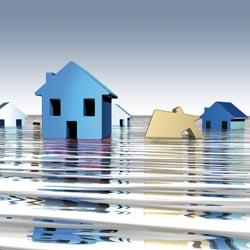Water damage is the most common cause of household insurance claims. Not surprisingly, it is also the area in which most damages claims are rejected by insurers.

The scary thing about most water damage is that it is usually very gradual and remains undetected until the last moment.
This is because “home owners often confuse damage arising gradually over time from poor maintenance with once-off and unforeseen catastrophic events like exceptional storms, snow or freak floods” says Gari Dombo, Managing Director of Alexander Forbes Insurance.
The scary thing about most water damage is that it is usually very gradual and remains undetected until the last moment when, suddenly, out of the blue, a wall collapses or a pipe or geyser bursts damaging a host of other household goods and property.
From an insurance perspective, “the onus falls on homeowners to regularly maintain their homes, checking for leakages or accumulating water so that if water-related damage occurs it cannot be attributed to lack of maintenance and can be genuinely classed as unforeseen” advises Dombo.
As such, Dombo encourages homeowners to take the following precautions to protect their homes against water damage:
- Regularly check and maintain the structural integrity of buildings. For example, making sure doors, window frames, sills and roofs are waterproof. “We see quite a few claims where water leaks into the house under a sliding door that has no lip for example,” says Dombo.
- If you suspect or have uncovered a leak in your home, contact a reliable maintenance company to repair the leak immediately. “Never take small cracks or leaks for granted, they may cause major damages to a home and its contents if ignored,” warns Dombo.
- Inspect the screws on fiber cement and iron roofs regularly. Screws on these roofs loosen over time and need to be repaired, replaced or re-sealed as necessary.
- Turn off the main water supply in your home if you are going on holiday. If a pipe leaks while you are away it may flow unchecked for weeks damaging your home and destroying most of your household contents.
- Check the gutters, valleys and roof flashing for blockages before each rainy season and clear these of leaves and debris. Anything that impedes the flow of water is likely to cause leaks and consequential damage. Consequential damage resulting from blocked gutters or valleys or perished flashing will not necessarily be covered by your insurer. Both galvanized zinc and membrane flashing become brittle and porous over time. Paint these regularly, preferably every year. Similarly, malthoid underlay used on some slate roofs becomes brittle with time allowing water to penetrate. Inspect this annually and replace if necessary.
- Locate the source of and fix damp issues without delay. “Damp resulting in damage due to poor maintenance will not be covered by your insurer,” warns Dombo.
- Turn off the main water supply if your water has been cut off for municipal repairs. When the municipal main is open, air may enter the system causing airlocks and blockages that could damage geysers and pipes. The mains should only be turned on again after the municipal repairs have been completed. When the municipal supply is interrupted “you also run the risk of leaving taps on, coming back to find your home flooded if the municipal system was switched on in your absence” warns Dombo.
- Have the seals and valves on your geyser looked at from time to time. “When you get the plumber in for routine maintenance, get him to give your geyser a once over, while he’s there. It may prevent a lot of damage and expense in the long run” advises Dombo.
- Always check and know where the stop cocks are situated for the toilet, sink, geyser, washing machine, shower, etc. If your toilet suddenly starts leaking in the middle of the night you can switch off the toilet valve and call a plumber in the morning.
- Building or buying above the flood line and thoroughly scoping how water drainage affects your property in bad weather or during a natural disaster is very important. If there is a natural water flow path through your property, “build a drain to help control the flow in wet times and be sure to build structures in such a way that the water can flow freely around them without building up or causing damage” advises Dombo.
In short, the best way to avoid water damage claims being rejected is to regularly maintain your home, acting quickly on the first suspicion of damp or a leak “so that any water damage that you suffer is genuinely unforeseen” concludes Dombo.
Readers' Comments Have a comment about this article? Email us now.








